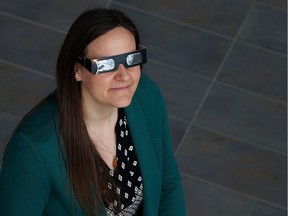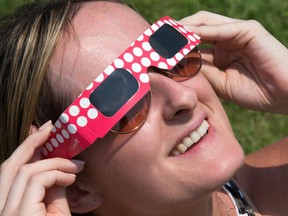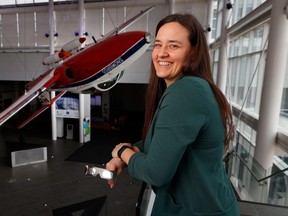Why is it dangerous to watch an eclipse? How can you tell if your eclipse viewing glasses are safe? We have the answers.

Article content
Joshua Smith is hoping for clear skies on April 8 so he can watch the rare total solar eclipse with his young son, who will be home from daycare that day.
What he doesn’t expect are new patients in his Cornwall, Ontario. optometry clinic.
Article content
“There is a lot of concern that after Monday, April 8, we will spend the rest of the week caring for people with solar retinopathy,” Smith said. “That’s not something we can just prescribe medication for and fix. The effects are long-lasting.”
Advertisement 2
Article content
Why is it dangerous to watch an eclipse?
Solar retinopathy, sometimes called eclipse retinopathy, is permanent eye damage that can occur from looking directly at the sun. Normally, the sun is so bright that we shiver and look away. However, during an eclipse, the brightness decreases so much that this natural instinct does not activate.
Even with the sun 98 per cent obscured, as it will be in Ottawa, the damage may be irreversible.
“In practice, it is never safe to look at the sun without protection. Even the small amount of sunlight that comes in can burn, literally scorch, the retina,” Smith said.
“There are no pain sensors in the retina. That burn won’t cause any pain that will make you look away. “You won’t even know you have it until your vision becomes blurry, perhaps hours or days later, or until an eye exam shows retinal damage,” she said.
How much can watching an eclipse damage your eyes?
“If you think of the retina as a target, the fovea is the target,” Smith says. “It’s the center of our vision.” If the damage affects the fovea, vision loss can be severe or even total blindness.
Advertisement 3
Article content
“If the burn is quite bad, it will leave a blind spot and, unfortunately, since you are looking directly at the sun, it will be right in the center of your field of vision. It can be extremely debilitating. “Anything that becomes a scar will remain a scar.”
Smith has seen several cases of solar retinopathy throughout his career, some in people who mistakenly believe that looking directly at the sun provides health benefits, but that is not the case.
How can you watch an eclipse safely?
One of the best sources of information on how to view the eclipse safely is the Ontario Association of Optometrists, which provides extensive information on its website: opton.on.ca.
Eclipse safety starts with using Eclipse glasses that meet the international safety standard. ISO 12312-2, to which :2015 is sometimes added (the year it was adopted). While that is the standard, the glasses must also be marked as certified (CE) by a second authority.
Regular sunglasses, even polarized ones, are not safe for viewing eclipses.

How can you tell if your eclipse viewing glasses are safe?
The incredible interest sparked by the April eclipse has led to the online sale of fake glasses, some printed with counterfeit ISO certification. Smith recommends purchasing from a reputable company.
Advertisement 4
Article content
The Ontario Optometric Association website includes a list of manufacturers recommended by the Ontario Association of Optometrists. American Astronomical Society.
“If you can see normal lights through the glasses, they are not safe for viewing the eclipse,” he said.
Those lucky enough to be within the path of totality, a strip roughly 184 kilometers wide that stretches across North America, from Mexico and Texas in the southwest to Newfoundland in the northeast, will see the sun completely obscured by the moon. During the brief minutes of totality, it is safe to look with the naked eye. But it is vital to protect your eyes again before the sun rises.
Map: Path of the 2024 solar eclipse on April 8
Is it safe to drive during an eclipse?
“The sun is no more dangerous during an eclipse than any other day,” said Cassandra Marion, scientific advisor at the Canadian Aviation and Space Museum’s Ingenium. “But now that there is something to see, we are forcing our body to ignore that reflection (looking away) and watch the spectacle. If you don’t have a pair of eclipse glasses, you can still go outside. You can still drive to work. “Just don’t look directly at the sun.”
Advertisement 5
Article content

How can you safely take photographs of an eclipse?
It’s not just your eyes that need protection. Cameras and smartphones can be permanently damaged if used without protection. Camera companies sell specially made solar filters for lenses, although they are in short supply as eclipse day approaches. To use your smartphone to take a photograph, it is possible to simply hold your eclipse glasses in front of the lens.
But one of the easiest ways to view the eclipse is also the simplest: A pinhole camera can be used to safely project an image of the sun onto a sheet of paper. Easier still, stand under a tree and watch the leaves filter a projection of hundreds of small bright crescents onto the ground as the sun eclipses.
How to know if you have damaged your eyesight watching an eclipse
Viewing the eclipse without proper eye protection can cause permanent eye damage. Be alert for these symptoms in the hours and days following the April 8 eclipse:
- Blurry vision
- Pain in the eyes or feeling of grit in the eyes.
- Distorted straight lines that appear bent, like a curved door frame.
- A blind spot in the central vision of one or both eyes.
- Greater sensitivity to light
- Dychromatopsia, that is, a change in the way you see color.
(Source: Ontario Association of Optometrists optom.on.ca)
We want to hear from you: How are you preparing for the total solar eclipse in Ottawa?
Our website is your destination for the latest news, so be sure to bookmark our homepage and Subscribe to our newsletters so we can keep you informed.
Recommended by Editorial
-

Total Solar Eclipse: Everything you need to know about April 8 in Eastern Ontario
-

Woman shot by police in Westboro, facing 13 charges, appears in court from hospital bed
Article content


